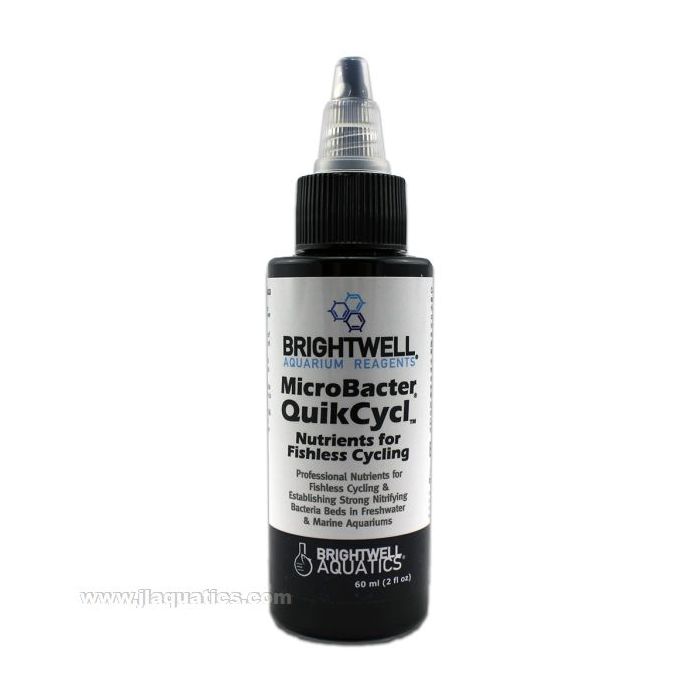Brightwell Aquatics MicroBacter QuikCycl - 60ml
Brightwell Aquatics MicroBacter QuikCycl
MicroBacter QuikCycl contains professional nutrients for fishless cycling and establishing strong nitrifying bacteria beds in freshwater and marine aquariums.
Caution: Contains Ammonia, Keep out of reach of children. Not for human consumption. If swallowed, contact a poison control center immediately.
NOTE: THIS PRODUCT IS DESIGNED FOR FISHLESS CYCLING. DO NOT EVER PUT INTO AN AQUARIUM CONTAINING LIVE FISH, PLANTS, OR INVERTEBRATES. ADD ANIMALS AFTER CYCLING IS COMPLETE!!!
This product alone will not cycle an aquarium, it simply provides the nutrients. You must use a good quality bacterial culture to establish the bacteria bed in the aquarium. We highly recommend Brightwell Aquatics MicroBacter Start XLM or MicroBacter Start XLF as appropriate for your aquarium. DO NOT OVERDOSE, EVER! Be patient, your animals lives are at stake!
You must use test kits to measure pH, ammonia, nitrite and nitrate to complete cycling on an aquarium. If you attempt to cycle the tank without proper testing, you are asking for disaster and will likely kill your fish. Brightwell Aquatics or J&L Aquatics is not responsible for indiscriminate use of this product! We recommend that you read up on aquarium cycling so that you know what it is all about. Please also consult our website at www.Brightwell Aquaticsaquatics.com for more information.
MicroBacter QuickCycl is intended for simultaneous use with a LIVE BACTERIAL CULTURE:
Bacteria products for aquarium use vary widely in characteristics, strength and overall design. The results you get will be quite different if you use an inferior bacteria culture or one that is out of date or has been stored incorrectly and at harmful temperatures. Nitrifying bacteria is damaged by heat and outright killed by freezing, so care must be taken to preserve its efficacy. If the bacterial product you use is dead, then this whole process will not work! Brightwell Aquatics highly recommends that you use either MicroBacter Start XLM, or MicroBacter Start XLF depending on whether you are starting a marine aquarium or a freshwater aquarium. For freshwater, a more economical choice can be made to use either FlorinBacter One, FlorinBacter or FlorinBacter7.
Instructions & Guidelines for using Brightwell Aquatics Aquatics MicroBacter QuikCycl
On Day 1:
a) Turn off skimmer, UV and remove fine filtration such as socks, make sure aquarium has sufficient filtration surface area, such as provided by Brightwell Aquatics XportTM world class bacterial filtration medium or Microbacter LatticeTM.
b) You must use a good dechlorinator first, such as Brightwell Aquatics Erase to remove chloramine and chlorine!
c) Prepare water and adjust pH, alkalinity, and temperature
d) Add full dose of QuikCyclTM at 4 drops per gallon or 1 ml per 5 gallons of tank capacity
e) Measure Ammonia which should be between 1 and 2 ppm total ammonia, which is ammonia plus ammonium (NH3 and NH4+). Do not add more to get the proper reading either today or throughout the days that follow. This is because the bacteria will quickly begin to use up the ammonia, and even though added, it will may not show up on your tests.
f) Add MicroBacter Start XLM, or MicroBacter Start XLF as appropriate for your aquarium, as directed.
On Day 2: Measure pH, Ammonia and Nitrite and record values.
On Day 3: Measure pH, Ammonia and Nitrite and record values.
On Day 4: Measure pH, Ammonia and Nitrite. If either Ammonia or Nitrite are over .25 ppm, then you can add more bacteria, if desired.
On Day 5: Measure pH, Ammonia and Nitrite and record values
On Day 6: Measure pH, Ammonia and Nitrite. If either Ammonia or Nitrite are over .25 ppm, then you can add more bacteria, if desired.
On Day 7: Measure pH, Ammonia and Nitrite. If using MicroBacter Start XLM, MicroBacter Start XLF and your Ammonia and Nitrite show zero, then measure Nitrate. If Nitrate is showing .25 ppm or higher, then your aquarium is cycled. If using any other bacteria, then go to Day 8.
On Day 8: Measure pH, Ammonia and Nitrite and record values.
On Day 9 and subsequent days: Measure pH, Ammonia and Nitrite. If Ammonia + Nitrite value is zero, then measure nitrate and if there is a reading of Nitrate at .25 ppm or higher, then the aquarium is cycled.
At conclusion of cycling, perform a 25% water change and begin adding hardy animals, SLOWLY. Restart UV, skimmer and filtration. Go Slow!


























